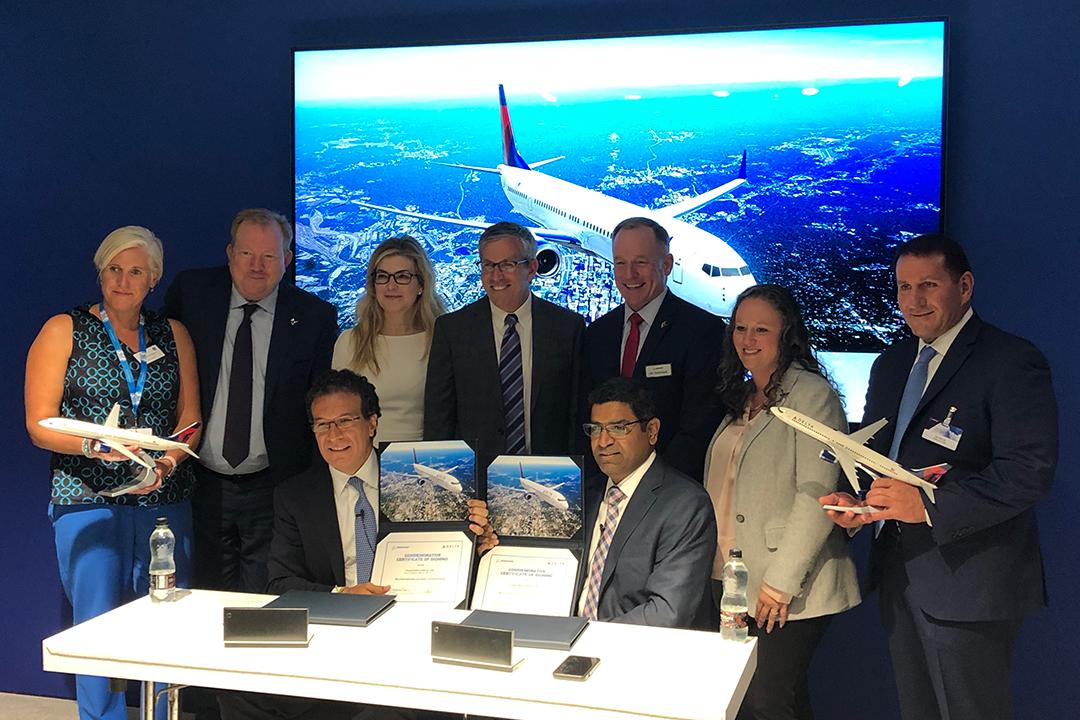
FARNBOROUGH—Delta Air Lines has announced an order for up to 130 Boeing 737-10s, marking both a major vote-of-confidence in the future of the yet-to-be-certified stretch-MAX model and a pivotal bridge-building deal in the recently strained relationship between carrier and aircraft manufacturer.
Calling the order a “delicate moment for us,” Mahendra Nair, Delta Fleet and TechOps Supply Chain senior vice president says the deal for 100 737-10s plus 30 options “is an inflection point in our relationship with Boeing and CFM.” Deliveries of the 737-10, a development version of which is making its first appearance at the Farnborough Airshow, for will run between 2025 and 2029.
The order comes as Boeing works to certify the aircraft under the shadow of a standoff with the U.S. Congress on whether to extend a year-end deadline that would require changes to the aircraft’s flight deck system. Although Boeing CEO Dave Calhoun has told Aviation Week that the aircraft could be canceled without some relief from Congress on the issue, company’s Commercial Airplanes president Stan Deal insists the chances of this drastic step happening are slim.
Relations between the airline—which has not ordered a new Boeing model for over a decade—hit a new low point in 2017 when Boeing filed a complaint with the U.S. International Trade Commission over Delta’s order for Bombardier CSeries aircraft, accusing the Canadian manufacturer of price dumping the aircraft below production costs. Five months later the U.S. Commerce Department issued a preliminary ruling to impose a 219.63% tariff on every Bombardier CSeries airliner brought into the country, effectively tripling the cost of each aircraft to Delta. The ensuing industry turmoil eventually led to Airbus acquiring the CSeries program and renaming it the A220.
The Delta deal—which Nair says has been in the works “for a long, long time”—hinges on cockpit commonality of the MAX version with the airline’s current 236-strong 737 Next Generation fleet. “If there’s a change to the EICAS (engine indicating and crew alerting system) [the flight deck change at the heart of the certification issue] then we would have to rethink about where we are because that’s the core principle as to why we announced this order,” he adds.
“We are obviously hoping that the airplane is common to the existing 737NG’s that we have right now, that’s a big part of the decision. In terms of scale, by the time these orders are done and we start retiring some of the older 737-800s we will have more than 300 of these aircraft. The 737 family will be one of the largest we will have in operation,” says Nair.
Boeing has been “very transparent in terms of all the modifications and we’ve had our chief pilot go out twice to Boeing to check out the differences training,” Nair adds. “So we feel pretty comfortable about the ability of our pilots to get trained on the 737-10 and the cockpit commonality. I would even urge everybody—Congress and the FAA—to consider the fact that commonality is the bellwether for us.”
In the event that Congress does not grant Boeing an extension and the manufacturer does decide to axe the -10, Nair says: “[Boeing] has come to the table in terms of what we would like from an option standpoint. But more importantly, this is really the airplane that we would want and we would hope that Boeing gets the extension that they need on certification as they desire and we can fly the MAX 10s—but we do have the flexibility.”
Delta’s deal also includes extensive refurbishing of 29 “gently used” 737-900ERs, Nair adds. The modifications will “probably be done sometime in the 2025 timeframe and we expect to fly them out in typical Delta fashion for another 20-25 years,” he adds.

